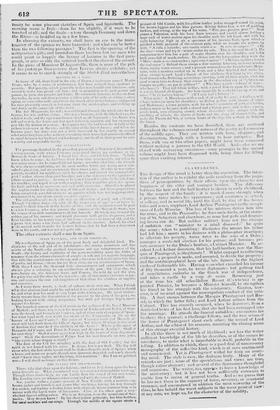PLANTA GENET.
Tire design of this novel is better than the execution. The MU:re-- tint' of the author is to exhibit the evils resulting from the preju-
dices of primogeniture, by their effects upon the character and
happiness of the elder and younger brother. The ditbeence between the heir and the half-brother is shown in early eleldhood, by the respect of the family ; it is mark, d more strongly when
a private tutor makes his appearance : and continues at. sehoet, at college, and in social life, until the Earl, by dint of his future titles and acres, supplants Lord Arthur Plantagenet ia the accept-
ance of Lady Blanche. The loss of his mistress drives hint into the arias, and to the Peninsula : he does such deeds, at the storm- ing of' St. Sebastian and elsewhere, as none but gods and despair- ing lovers can do. But neither military finite nor the charms of ambition can " minister to a mind diseased :" he quits
the army; takes to gambling: dissipates the means his htther had left hint ; meets in his distress with a philosopher in eclipse; to alleviate his poverty, turns tutor to the sons of a Duke ;
manages a contested election for his patron; and becomes pri- vate secretary to the Duke's brother, a Cabinet Minister. By ac- cident Lord ,trthur discovers, that his half-brother, now the Mar- quis of Plantagent, is illegitimate ! Whilst engaged in collecting
evidence, a proposal is made, and accepted, to divide the property; and the autobiographical hero of the tale figures in the highest
circles of fitshionable life. Having somewhat exceeded his income of fifty thousand a year, he turns diplomate: but gettinfz tire( of negotiations, embarks in the Greek war of independence, and takes a castle by a romp de nmin. Returning just - at the time his old schoolfellow Basset (CANNING) is ap- pointed Premier, he becomes a Minister himself, to strengthen his friend in his struggle with the aristocracy. Genius, how- ever, is of no avail against the unscrupulous conduct of the nobi- lity. A duel ensues between the Marquis Plantagenet and Bas-
set, in which the latter falls; and Lord Arthur retires from the
Cabinet. This has scarcely occurred, when he discovers, from a death-bed letter of his first love, that she hail been entrapped into
the marriage. He attends the funeral unbidden ; encounters his brother; they quarrel; a challenge follows, and the two scions of the house of Plantagenet shoot each other: the second of Lord Arthur, and the Otter of his remains, narratiug the closing scene of this strange eventful history. In all this there is not much of likelihood; nor has the writer sufficient knowledge of the life he describes, or of the scenes he introduces, to make what is improbable in itself, probable in the
telling. In addition to which, there is a good deal of unnecessary monography of the reflective kind, which is at once sentimental and nonsensical. Yet is Plantagenet withal far from an every-
day novel. The style is easy, the dialogue lively. Many of the remarks are just ; some of the speculations and views are true, though rather abstract ; and several of the discussions thoughtful and ineenious. The writer, too, appears to have a knowledge of
the aristocracy; but it has not been sufficiently extensive to enable him to arrive at general truths. And as we guess that he has met them in the capacity of tutor, secretary, or senatorial crammer, and encountered in addition the most unworthy of. the class, be has beheld the worst subjects in the worst point of slew : at any rate, we hope so, for the character of the nobility.


























 Previous page
Previous page